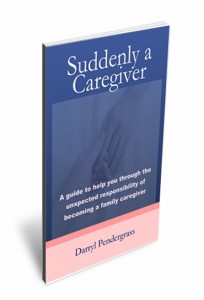Caring for someone that is seriously ill is difficult and time-consuming work. For the new caregiver, absorbing the new responsibility into an already busy life can be overwhelming. This article provides some advice about taking care of yourself to enhance your effectiveness as a caregiver and serves to reduce your stress at the same time.
Focus on Your Own Health and Well-being
According to the National Alliance for Caregiving report, about 17% of the caregivers reported a decline in their own health since the start of the caregiving. Just eight months into my caregiving experience, I suffered a heart attack. The event served to remind me of the need to care for myself. I recovered quickly from the heart attack but the event reminded me that I could not perform my care giving responsibilities properly if my own heath suffered. Therefore, it is important to underscore the need for caregivers to find the time to take care of your own physical and mental wellbeing. Ensuring your own health and well-being prevents you from becoming ineffective as a caregiver.
Time with Family and Friends
The caregiving report also revealed that over half of caregivers stated that caregiving reduced the time they spent with their family and friends. Those who sacrificed that time with family and friends reported a higher stress level than those who maintained their time with family and friends (47% compared to 14%). It is easy to withdrawal from friends and family during the caregiving experience because of the new demands on one’s life. However, as this study reports, withdrawing or minimizing time with family and friends can lead to increased stress levels.
Prolonged Stress and Burnout
Prolonged stress can lead eventually to burnout. Burnout is often associated with overwhelming exhaustion, feelings of detachment, and a sense of becoming ineffective. Anxiety and depression are common side effects reported by caregivers. Learning about stress and burnout along with the effects on your personal well-being are necessary for early recognition and application of preventative techniques or treatments. The caregiver role often includes riding the emotional roller coaster that results from stress and uncertainty about the future. For me, one beneficial technique was listening to friends and family. They often recognized or sensed the stress that I felt before I did. Listening, followed by actions to face and address the stress were critical to managing my personal well-being.
Find Time for Yourself
Finding time to care for yourself is a critical step toward maintaining your own well-being as a caregiver. What works for one person might not work for another so it is important that you find what works for you. Some people share that exercising, meditating, or listening to music provides the alone time needed to help relieve stress. Others share that going to the movies, taking walks, hiking, or going for a coffee with a friend provided the time needed to reflect on themselves. The bottom line is that you must find what works for you. Find some time for yourself to allow your own body and mind to recuperate and re-energize.
Caring for your own health and well-being is not a selfish act. Some believe that focusing solely on the needs of the care recipient is the noble and correct thing to do. However, a need for balance exists, especially in a prolonged caregiving situation. Caring for yourself is actually a selfless endeavor since taking care of yourself enables you to take care of your loved one more effectively than you could if you allowed stress to dominate your life.
References
National Alliance for Caregiving and AARP (2009). Caregiving in the U.S. 2009). Retrieved from http://www.caregiving.org/pdf/research/Caregiving_in_the_US_2009_full_report.pdf

